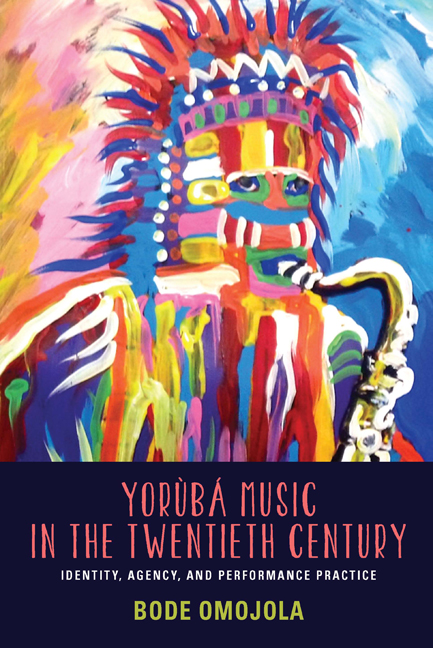Book contents
- Frontmatter
- Dedication
- Contents
- Acknowledgments
- Introduction
- 1 Yorùbá Drumming: Performance Practice and the Politics of Identity
- 2 Talking and Stammering: Toward an Analysis of Yorùbá Drumming
- 3 Songs of the King’s Wives: Gendered and Social Identities in Yorùbá Vocal Performance
- 4 The Aírégbé Song Tradition of Yorùbá Female Chiefs
- 5 Yorùbá Music in the Christian Liturgy: Notation, Performance, and Identity
- 6 Yorùbá Music in Christian Worship: The Aládǔrà Church
- 7 Yorùbá Popular Music: Hybridity, Identity, and Power
- 8 Yorùbá Islamic Popular Music
- Conclusion
- Appendixes
- Notes
- Selected Discography and Videography
- Bibliography
- Index
8 - Yorùbá Islamic Popular Music
Published online by Cambridge University Press: 11 January 2024
- Frontmatter
- Dedication
- Contents
- Acknowledgments
- Introduction
- 1 Yorùbá Drumming: Performance Practice and the Politics of Identity
- 2 Talking and Stammering: Toward an Analysis of Yorùbá Drumming
- 3 Songs of the King’s Wives: Gendered and Social Identities in Yorùbá Vocal Performance
- 4 The Aírégbé Song Tradition of Yorùbá Female Chiefs
- 5 Yorùbá Music in the Christian Liturgy: Notation, Performance, and Identity
- 6 Yorùbá Music in Christian Worship: The Aládǔrà Church
- 7 Yorùbá Popular Music: Hybridity, Identity, and Power
- 8 Yorùbá Islamic Popular Music
- Conclusion
- Appendixes
- Notes
- Selected Discography and Videography
- Bibliography
- Index
Summary
My discussion of Yorùbá popular music would be glaringly incomplete without an examination of the impact of Islam, a religion which, like Christianity, has played a major role in the generation of new Yorùbá musical idioms, especially since the beginning of the twentieth century. As I have explained in another study,1 Islam was introduced into parts of present-day northern Nigeria as far back as the eleventh century through the activities of Berber and Arab traders, and the Moroccan invasion of the area. The acceptance of Islam by the ruling dynasty of the Kanem-Borno would later facilitate a rapid growth of the religion in northern Nigeria, from the fourteenth century onward. The spread of Islam to Yorùbáland further south was pioneered by Islamic jihadists who, upon conquering areas formerly under the control of the Old Òyó kingdom in the nineteenth century, helped to consolidate the growth of the religion in towns like Ìlorin, Ògbómòsó, Òyó, and Òffà. Although the onslaught of the jihadists was contained successfully in the more southerly parts, especially in Òsogbo, where they were fiercely repelled, Islam is today a major religion in Yorùbáland, notably in states like Òyó, Òsun, and Lagos.
By Yorùbá Islamic musical popular music, I refer to musical practices and styles that are associated with Islamic religious events outside the mosque, and which often, but not necessarily always, project Islamic themes. It should be remembered that musical renditions other than call-to-worship chants are forbidden inside the mosque, a practice which contrasts vividly with the prominent use of music—instrumental and vocal—within Christian liturgy. Islam-influenced Yorùbá music has therefore had to develop outside the context of religious worship, mainly as a form of social entertainment in which Islamic themes are projected within quasi-religious events outside the mosque. Such musical activities, although dominated by Muslim performers, have been transformed into specific popular idioms enjoyed and patronized by the generality of Yorùbá people, irrespective of their religious affiliation.
The most prominent genres of Yorùbá Islamic popular music are sákárà, àpàlà, fújì, and wákà. The first three are male-dominated, while wákà is performed mainly by women.
- Type
- Chapter
- Information
- Yorùbá Music in the Twentieth CenturyIdentity, Agency, and Performance Practice, pp. 204 - 220Publisher: Boydell & BrewerPrint publication year: 2014



